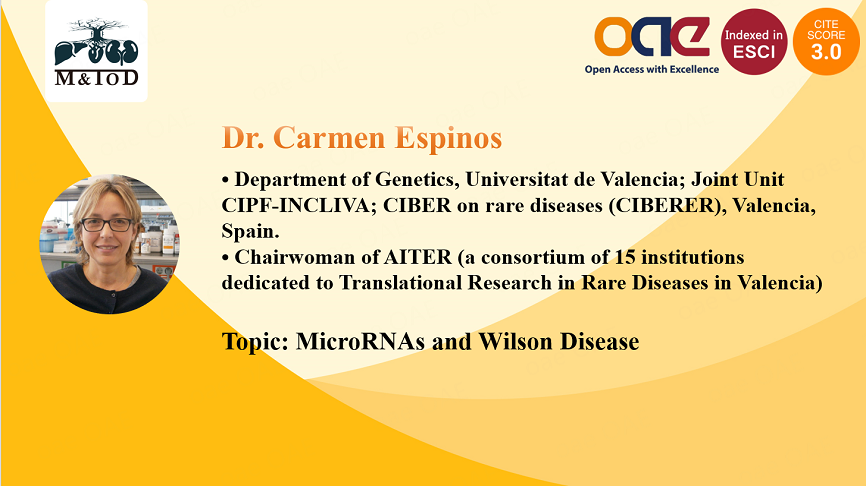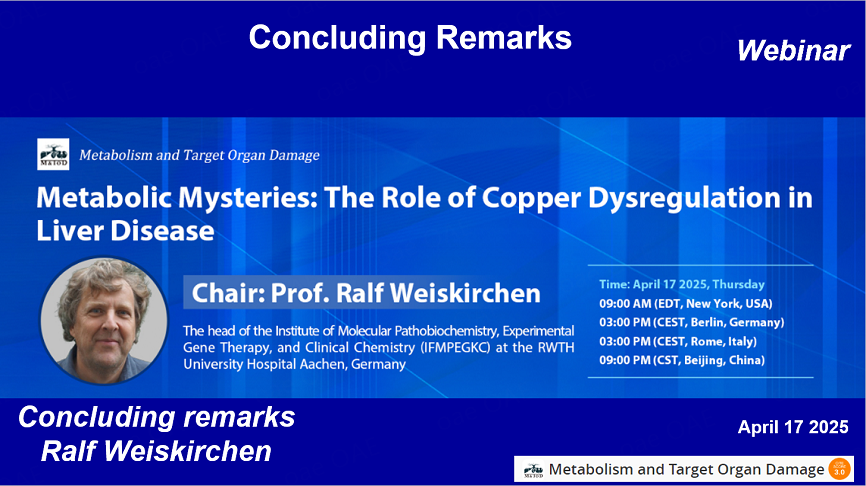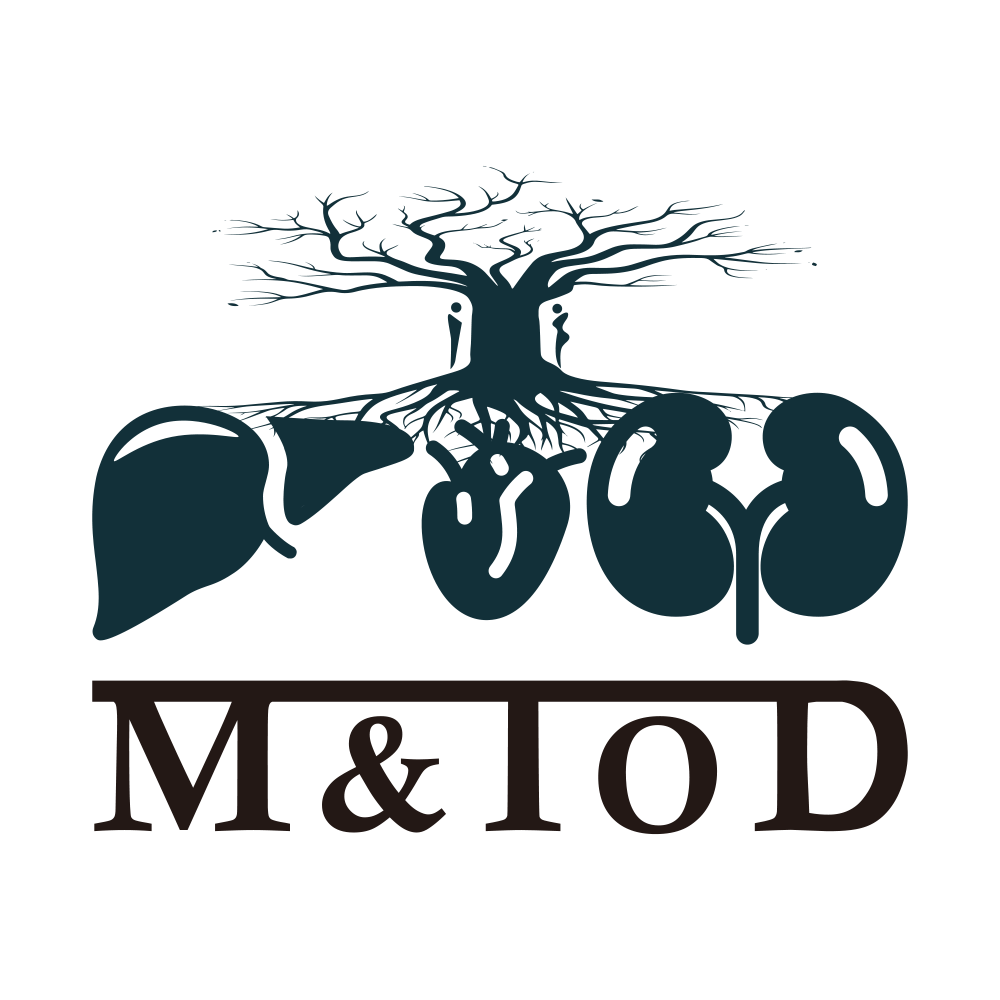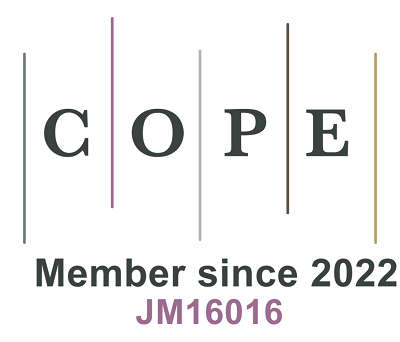Contents
Chair

Prof. Ralf Weiskirchen
The head of the Institute of Molecular Pathobiochemistry, Experimental Gene Therapy, and Clinical Chemistry (IFMPEGKC) at the RWTH University Hospital Aachen, Germany
Biography
Prof. Ralf Weiskirchen was born on February 2, 1964 in Bergisch Gladbach, North Rhine Westphalia (Germany). After his school education he studied Biology and earned his PhD with distinction at the University of Cologne (Germany). Thereafter, he worked as a Research Associate in the Institute of Biochemistry at the University of Innsbruck (Austria). Back in Germany, he habilitated at the RWTH University Hospital Aachen (UKA) and became a Professor assignment that he took in 2007. Currently, he is head of the Institute of Molecular Pathobiochemistry, Experimental Gene Therapy and Clinical Chemistry (IFMPEGKC) at the UKA. Prof. Weiskirchen has published over 490 articles in internationally renowned journals, with a total citation count exceeding 22,000 and an H-index of 72. His major focus is the analysis of TGF-β/BMP and PDGF signalling pathways in the pathogenesis of liver disease. Professor Weiskirchen maintains a variety of national and international cooperation focussing on molecular aspects of disease formation and therapy. Moreover, his work is focused on the identification and evaluation of novel biomarkers.
Prof. Ralf Weiskirchen was born on February 2, 1964 in Bergisch Gladbach, North Rhine Westphalia (Germany). After his school education he studied Biology and earned his PhD with distinction at the University of Cologne (Germany). Thereafter, he worked as a Research Associate in the Institute of Biochemistry at the University of Innsbruck (Austria). Back in Germany, he habilitated at the RWTH University Hospital Aachen (UKA) and became a Professor assignment that he took in 2007. Currently, he is head of the Institute of Molecular Pathobiochemistry, Experimental Gene Therapy and Clinical Chemistry (IFMPEGKC) at the UKA. Prof. Weiskirchen has published over 490 articles in internationally renowned journals, with a total citation count exceeding 22,000 and an H-index of 72. His major focus is the analysis of TGF-β/BMP and PDGF signalling pathways in the pathogenesis of liver disease. Professor Weiskirchen maintains a variety of national and international cooperation focussing on molecular aspects of disease formation and therapy. Moreover, his work is focused on the identification and evaluation of novel biomarkers.
Speaker(s)

Prof. Wolfgang Stremmel
Medical Center Baden-Baden, Baden-Baden, Germany
Topic: Pathophysiology of Copper Metabolism in Wilson Disease
Topic: Pathophysiology of Copper Metabolism in Wilson Disease
Biography
Dr. Wolfgang Stremmel is a highly distinguished expert in internal medicine and gastroenterology, renowned for his contributions to the study of metabolic diseases affecting the liver and gut. He obtained his medical degree from the University of Cologne, where he also earned a Ph.D. in Biochemistry focusing on lipid metabolism. In 1978, he joined the Department of Internal Medicine at the University Hospital in Düsseldorf, where he later obtained board certifications in Internal Medicine and Gastroenterology, rising to the position of professor. His research experience includes two years at Mount Sinai Medical Center in New York, where he contributed to the discovery of a transport system for bilirubin, fatty acids, and iron. In recognition of his scientific achievements, he was awarded the Gottfried Wilhelm Leibniz Award by the German Research Council (DFG) in 1989, among other prestigious honors, including the European Award of Gastroenterology, the Thannhauser Award of the German Gastroenterological Association, the Teaching Award from the Faculty of Medicine, Heidelberg, and an honorary doctorate from the University of Medicine in Tbilisi, Georgia.
In 1994, Dr. Stremmel was appointed Head of the Department of Internal Medicine (Gastroenterology, Infectious Diseases, and Intoxication) at the University Hospital in Heidelberg, where he led pioneering research until his retirement in 2018. His work has significantly advanced the understanding of iron and copper metabolism, fatty acid transport, phosphatidylcholine function in gut health, and novel anti-inflammatory therapies for liver diseases. Notably, his research on phosphatidylcholine transport has had a profound impact on the treatment of ulcerative colitis. His studies on primary sclerosing cholangitis, tight junction dysfunction, and bile acid-phospholipid conjugates have further contributed to innovative therapeutic approaches. Throughout his career, Dr. Stremmel secured continuous research funding from the Deutsche Forschungsgemeinschaft (DFG) from 1980 to 2018, including serving as project coordinator of SFB 601 "Molecular Pathogenesis of Hepatogastroenterological Diseases" from 1998 to 2000.
Dr. Stremmel’s scientific contributions are extensive, with over 680 peer-reviewed publications in leading international journals, accumulating more than 33,600 citations and an H-index of 93, reflecting his significant impact on the field. Even after retiring from his university position, he remains deeply engaged in research and clinical practice. He currently runs a private practice for Internal Medicine in Baden-Baden, where he continues to explore innovative and effective therapies for liver and gastrointestinal diseases. His lifelong dedication to science and patient care has earned him a place among the World’s Top 2% of Scientists in 2024.
Dr. Wolfgang Stremmel is a highly distinguished expert in internal medicine and gastroenterology, renowned for his contributions to the study of metabolic diseases affecting the liver and gut. He obtained his medical degree from the University of Cologne, where he also earned a Ph.D. in Biochemistry focusing on lipid metabolism. In 1978, he joined the Department of Internal Medicine at the University Hospital in Düsseldorf, where he later obtained board certifications in Internal Medicine and Gastroenterology, rising to the position of professor. His research experience includes two years at Mount Sinai Medical Center in New York, where he contributed to the discovery of a transport system for bilirubin, fatty acids, and iron. In recognition of his scientific achievements, he was awarded the Gottfried Wilhelm Leibniz Award by the German Research Council (DFG) in 1989, among other prestigious honors, including the European Award of Gastroenterology, the Thannhauser Award of the German Gastroenterological Association, the Teaching Award from the Faculty of Medicine, Heidelberg, and an honorary doctorate from the University of Medicine in Tbilisi, Georgia.
In 1994, Dr. Stremmel was appointed Head of the Department of Internal Medicine (Gastroenterology, Infectious Diseases, and Intoxication) at the University Hospital in Heidelberg, where he led pioneering research until his retirement in 2018. His work has significantly advanced the understanding of iron and copper metabolism, fatty acid transport, phosphatidylcholine function in gut health, and novel anti-inflammatory therapies for liver diseases. Notably, his research on phosphatidylcholine transport has had a profound impact on the treatment of ulcerative colitis. His studies on primary sclerosing cholangitis, tight junction dysfunction, and bile acid-phospholipid conjugates have further contributed to innovative therapeutic approaches. Throughout his career, Dr. Stremmel secured continuous research funding from the Deutsche Forschungsgemeinschaft (DFG) from 1980 to 2018, including serving as project coordinator of SFB 601 "Molecular Pathogenesis of Hepatogastroenterological Diseases" from 1998 to 2000.
Dr. Stremmel’s scientific contributions are extensive, with over 680 peer-reviewed publications in leading international journals, accumulating more than 33,600 citations and an H-index of 93, reflecting his significant impact on the field. Even after retiring from his university position, he remains deeply engaged in research and clinical practice. He currently runs a private practice for Internal Medicine in Baden-Baden, where he continues to explore innovative and effective therapies for liver and gastrointestinal diseases. His lifelong dedication to science and patient care has earned him a place among the World’s Top 2% of Scientists in 2024.

Prof. Kay L Double
Brain and Mind Centre and School of Medical Sciences (Neuroscience), The University of Sydney, Sydney, NSW, Australia
Topic: Copper Dyshomeostasis and Neurodegenerative Disease
Topic: Copper Dyshomeostasis and Neurodegenerative Disease
Biography
Dr. Kay L Double is an Professor of Neuroscience at the Sydney Medical School, based at the Brain and Mind Centre, University of Sydney. Her research integrates neuropathology and quantitative neurochemistry to investigate disease mechanisms in neurodegenerative disorders, with a particular focus on Parkinson’s disease (PD) and motor neuron disease (MND). She explores mechanisms of selective neuronal vulnerability, early biomarkers of neurodegeneration, and potential therapeutic strategies for these disorders.
Dr. Double has been awarded prestigious funding, including an Alexander von Humboldt Research Fellowship (Germany) and multiple Australian federal research fellowships and grants. Her pioneering work on neuromelanin, a pigment found in dopaminergic neurons, redefined its role in the healthy brain, demonstrating its neuroprotective function—challenging the previous notion that neuromelanin was detrimental. She further identified abnormal neuromelanin changes and metal dysregulation in the Parkinson’s disease brain, suggesting a role in disease etiology. This discovery led her to investigate other metal-binding proteins in Parkinson’s disease, culminating in the identification of SOD1 proteinopathy, a pathological feature that links Parkinson’s disease with familial amyotrophic lateral sclerosis (ALS).
Her current research focuses on copper dyshomeostasis and dysfunctional copper-binding proteins in Parkinson’s disease pathogenesis, as well as validating molecular pathways of SOD1 neurotoxicity in ALS. As a leader in the field, Dr. Double actively contributes to the scientific community, serving as Executive Secretary of the Australasian Neuroscience Society and Chair of the Advisory Committee of Parkinson’s New South Wales. Her work continues to bridge basic science and clinical application, driving forward our understanding of neurodegenerative diseases and paving the way for novel therapeutic strategies.
Dr. Kay L Double is an Professor of Neuroscience at the Sydney Medical School, based at the Brain and Mind Centre, University of Sydney. Her research integrates neuropathology and quantitative neurochemistry to investigate disease mechanisms in neurodegenerative disorders, with a particular focus on Parkinson’s disease (PD) and motor neuron disease (MND). She explores mechanisms of selective neuronal vulnerability, early biomarkers of neurodegeneration, and potential therapeutic strategies for these disorders.
Dr. Double has been awarded prestigious funding, including an Alexander von Humboldt Research Fellowship (Germany) and multiple Australian federal research fellowships and grants. Her pioneering work on neuromelanin, a pigment found in dopaminergic neurons, redefined its role in the healthy brain, demonstrating its neuroprotective function—challenging the previous notion that neuromelanin was detrimental. She further identified abnormal neuromelanin changes and metal dysregulation in the Parkinson’s disease brain, suggesting a role in disease etiology. This discovery led her to investigate other metal-binding proteins in Parkinson’s disease, culminating in the identification of SOD1 proteinopathy, a pathological feature that links Parkinson’s disease with familial amyotrophic lateral sclerosis (ALS).
Her current research focuses on copper dyshomeostasis and dysfunctional copper-binding proteins in Parkinson’s disease pathogenesis, as well as validating molecular pathways of SOD1 neurotoxicity in ALS. As a leader in the field, Dr. Double actively contributes to the scientific community, serving as Executive Secretary of the Australasian Neuroscience Society and Chair of the Advisory Committee of Parkinson’s New South Wales. Her work continues to bridge basic science and clinical application, driving forward our understanding of neurodegenerative diseases and paving the way for novel therapeutic strategies.

Dr. Louis C. Penning
Faculty of Veterinary Sciences, Utrecht University, Utrecht, The Netherlands
Topic: The Copper-Lipid Droplet Connection
Topic: The Copper-Lipid Droplet Connection
Biography
Dr. Louis C. Penning is an Associate Professor of Veterinary Regenerative Medicine at the Faculty of Veterinary Medicine, Utrecht University (UU), the Netherlands. Dr. Penning’s research focuses on regenerative medicine, particularly in the gastrointestinal system, and he is a leading expert in organoid technology dedicated to understanding disease progression. One of his key research areas includes inherited hepatic copper toxicosis, using an in-house colony of COMMD1-deficient dogs and their liver organoids as translational models for human and veterinary hepatology. His contributions underscore the increasing recognition of veterinary medicine's unique value to human medicine, particularly in the development of predictive animal models for regenerative therapies.
Dr. Penning actively contributes to scientific societies, the Utrecht Regenerative Helpdesk (to improve communication with society), faculty board, and several editorial boards. In his spare time, he is on the tatami, practicing and judging classical Japanese self-defence techniques.
Dr. Louis C. Penning is an Associate Professor of Veterinary Regenerative Medicine at the Faculty of Veterinary Medicine, Utrecht University (UU), the Netherlands. Dr. Penning’s research focuses on regenerative medicine, particularly in the gastrointestinal system, and he is a leading expert in organoid technology dedicated to understanding disease progression. One of his key research areas includes inherited hepatic copper toxicosis, using an in-house colony of COMMD1-deficient dogs and their liver organoids as translational models for human and veterinary hepatology. His contributions underscore the increasing recognition of veterinary medicine's unique value to human medicine, particularly in the development of predictive animal models for regenerative therapies.
Dr. Penning actively contributes to scientific societies, the Utrecht Regenerative Helpdesk (to improve communication with society), faculty board, and several editorial boards. In his spare time, he is on the tatami, practicing and judging classical Japanese self-defence techniques.

Dr. Carmen Espinos
• Department of Genetics, Universitat de Valencia; Joint Unit CIPF-INCLIVA; CIBER on rare diseases (CIBERER), Valencia, Spain.
• Chairwoman of AITER (a consortium of 15 institutions dedicated to Translational Research in Rare Diseases in Valencia)
Topic: MicroRNAs and Wilson Disease
• Chairwoman of AITER (a consortium of 15 institutions dedicated to Translational Research in Rare Diseases in Valencia)
Topic: MicroRNAs and Wilson Disease
Biography
Dr. Carmen Espinós holds a degree in Biological Sciences with a specialization in Biochemistry from the University of Valencia. Her scientific career has been dedicated to investigating the genetic foundations of rare diseases. She earned her Ph.D. in 1998 from the Department of Genetics at the University of Valencia, where she focused on the epidemiology and molecular genetics of Usher syndrome. Following her doctoral studies, Dr. Espinós completed postdoctoral research at La Fe University Hospital, working on hemophilia and other coagulation disorders. She later joined the Institute of Biomedicine of Valencia (CSIC), where she contributed to research on ataxias and peripheral neuropathies. In 2009, she was awarded a Miguel Servet research contract by the Carlos III Health Institute, co-funded by the CIBER for Rare Diseases (CIBERER). This prestigious grant enabled her to establish her own research group, which she has led at the Príncipe Felipe Research Center (CIPF) since 2013. Recently, Dr. Espinós joined the Department of Genetics at the University of Valencia as a researcher affiliated with the INCLIVA Health Research Institute. Her current research focuses on the molecular basis of Mendelian movement disorders, the genetics and biomarkers of Wilson’s disease, and the identification of biomarkers for childhood epilepsy.(+info: https://espinos.cipf.es).
Dr. Carmen Espinós holds a degree in Biological Sciences with a specialization in Biochemistry from the University of Valencia. Her scientific career has been dedicated to investigating the genetic foundations of rare diseases. She earned her Ph.D. in 1998 from the Department of Genetics at the University of Valencia, where she focused on the epidemiology and molecular genetics of Usher syndrome. Following her doctoral studies, Dr. Espinós completed postdoctoral research at La Fe University Hospital, working on hemophilia and other coagulation disorders. She later joined the Institute of Biomedicine of Valencia (CSIC), where she contributed to research on ataxias and peripheral neuropathies. In 2009, she was awarded a Miguel Servet research contract by the Carlos III Health Institute, co-funded by the CIBER for Rare Diseases (CIBERER). This prestigious grant enabled her to establish her own research group, which she has led at the Príncipe Felipe Research Center (CIPF) since 2013. Recently, Dr. Espinós joined the Department of Genetics at the University of Valencia as a researcher affiliated with the INCLIVA Health Research Institute. Her current research focuses on the molecular basis of Mendelian movement disorders, the genetics and biomarkers of Wilson’s disease, and the identification of biomarkers for childhood epilepsy.(+info: https://espinos.cipf.es).
Programme
Programme

Moments






Presentation

NaN

NaN

NaN

NaN

NaN

NaN










